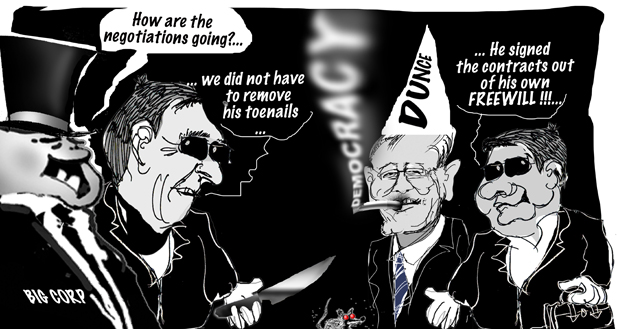Search
Recent comments
- whistleblow.....
11 hours 22 min ago - demosocialism....
20 hours 36 min ago - front cover up....
20 hours 50 min ago - the trick....
1 day 7 hours ago - bibi's wants.....
1 day 13 hours ago - gas snap....
1 day 16 hours ago - challenge....
1 day 17 hours ago - too late....
1 day 18 hours ago - spilling....
1 day 19 hours ago - US bullshit.....
1 day 19 hours ago
Democracy Links
Member's Off-site Blogs
with idiots in charge of the future you can only worry or bury your head in the sand... we're screwed.

When the text of the Trans-Pacific Partnership was finally released last Friday morning, many supporters and detractors went straight to one of its most controversial provisions: so-called investor state dispute settlement (ISDS). This provision, opposed by Labor and the Greens in Australia, gives foreign investors the power to sue the Australian government for introducing legislation that harms their investment.
Andrew Robb, the Australian trade minister, was quick to defend the agreement from its detractors. He lauded Australia’s efforts to secure significant exemptions, which he said would make it impossible for foreign corporations to sue the Australian government for enacting environmental policy. “It’s a trade agreement which looks at issues relating to trade that can affect public policy in the environmental area … It does provide safeguards, the best safeguards that have ever been provided in any agreement in this regard.”
Robb said critics were just the usual suspects “jumping at shadows”, “peddling lines they’ve been peddling for years without having a decent look at what’s been negotiated”.
But George Kahale III is not one of the usual suspects. As chairman of the world’s leading legal arbitration firm – Curtis, Mallet-Prevost, Colt & Mosle LLP – his core business is to defend governments being sued by foreign investors under ISDS. Some of his clients are included in the TPP, and he says the trade minister’s critics are right: “There are significant improvements in this treaty, but they do not immunise Australia from any of these claims. If the trade minister is saying, ‘We’re not at risk for regulating environmental matters’, then the trade minister is wrong.”
- By Gus Leonisky at 10 Nov 2015 - 8:46pm
- Gus Leonisky's blog
- Login or register to post comments
zero benefits...
Kahale’s criticisms have been echoed by Robert French, the chief justice of Australia’s high court. In a speech last July, he said: “Arbitral tribunals set up under ISDS provisions are not courts, nor are they required to act like courts, yet their decisions may include awards which significantly impact on national economies and on regulatory systems within nation states.”
Kahale believes the ISDS system is so badly flawed it should be abolished, and started again from scratch. Australia, he warns, should think very carefully before signing up to it in the TPP.
“What I would say to Australians is that while the system is in the state it’s in right now, signing any new treaty is a very serious mistake. You have to weigh the benefits against the burdens. Somebody at some point might be able to explain to me where all the benefits are, but I certainly haven’t seen any.”
read more: http://www.theguardian.com/business/2015/nov/10/tpps-clauses-that-let-australia-be-sued-are-weapons-of-legal-destruction-says-lawyer
merchandising shibboleths...
With evident pride, Carr demonstrated that liberal internationalist shibboleths and norms were in fact the “concrete expressions of particular conditions and interests.” Global free trade, for example, was (and is) advanced as a selfless good by those powers that gain from it economically, politically, and militarily. Consistently, the weapons of the dominant powers (battleships, and, today, nuclear weapons) are enshrined in international agreements as defensive, while those of the weaker states that challenge the status quo (submarines, and today nuclear weapons) are condemned in utopian schemes as offensive and dastardly.
Carr was no crude debunker. He wasn’t interested in demonstrating utopianism’s failure to live up to its principles; he was intent on revealing the absence of “any absolute and disinterested standard for the conduct of international affairs.” In very effectively arguing that “‘international order’ and ‘international solidarity’ will always be slogans of those who feel strong enough to impose them on others,” Carr merely wished to show that “these supposedly absolute and universal principles were not principles at all, but the unconscious reflexions of national policy based on a particular interpretation of national interest at a particular time.”
read more: http://www.theamericanconservative.com/articles/utopianism-is-not-a-strategy/
See also: "The Age of Deceit"
and all the articles in: http://www.yourdemocracy.net.au/drupal/node/30164
selling offals to japan should be good enough...
The trade minister, Andrew Robb, has rejected calls for an independent cost-benefit analysis of the Trans-Pacific Partnership after the World Bank estimated it could lift Australia’s economic output by just 0.7% by 2030.
Robb, who signed the regional trade pact with counterparts from 11 other nations in New Zealand on Thursday, dismissed opponents of the deal as “the usual suspects” who would not be persuaded by a new inquiry.
He also played down the risk of the Australian government being sued under controversial investor-state dispute settlement (ISDS) clauses, pointing to carve-outs for health and environmental measures.
Hundreds of protesters gathered outside the SkyCity building in Auckland to object to the signing of the agreement on Thursday.
Opposition within Australia has also been building. Before the meeting, 59 organisations, including the Australian Fair Trade and Investment Network, World Vision, the Public Health Association of Australia and numerous unions, signed an open letter calling on the government to take up the Productivity Commission’s offer to assess the costs and benefits.
read more: http://www.theguardian.com/australia-news/2016/feb/04/tpp-signing-andrew-robb-rejects-calls-for-cost-benefit-analysis-of-trade-deal
Pork pies in the sky... Andrew Robb should resign for not providing a cost analysis for a project that's truly worth peanuts.